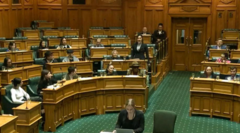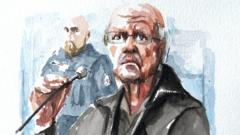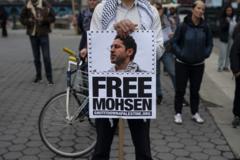The targeted assassination of UnitedHealthcare CEO Brian Thompson near a New York hotel has revealed widespread anger at the insurance industry, leading to protests and stark online reactions regarding denied claims and the complexities of healthcare coverage.
CEO's Murder Ignites Outrage Over America's Healthcare System

CEO's Murder Ignites Outrage Over America's Healthcare System
The tragic killing of health insurance executive Brian Thompson has spotlighted deep-rooted frustrations with the U.S. healthcare system, provoking protests and online backlash against insurers.
The shocking murder of Brian Thompson, CEO of UnitedHealthcare, outside a hotel in New York City has catalyzed a wave of anger towards the U.S. healthcare system. The "brazen and targeted" killing has not only devastated Thompson's family and friends but also spotlighted the mounting frustrations many Americans hold against a convoluted and expensive insurance industry.
This summer, more than 100 protestors gathered at the headquarters of UnitedHealthcare in Minnesota. They voiced their grievances over the company's policies and widespread claim denials, rallying under the banner of the People's Action Institute. Eleven individuals were arrested for blocking a road during the protests, which drew attention from across the nation, with demonstrators coming from states such as Maine, Texas, and New York.
"Prior authorisation," a term that allows insurers to vet and approve medical treatments before payment, has become a rallying cry for those who believe it leads to unnecessary hurdles and denied care. Unai Montes-Irueste, the media strategy director of People’s Action, noted that many individuals participating in the protests shared personal stories about the frustration they faced with denied treatments.
The anger simmered to a boiling point following Thompson's death, as many took to social media to share their experiences with insurance firms. Messages found on shell casings at the murder scene, including "deny," "defend," and "depose," have drawn connections to the controversial tactics employed by insurers to avoid paying for care. Thompson’s LinkedIn comments reveal the many frustrations directed at him personally, with one woman accusing the company of consistently denying her medication for her stage 4 cancer.
Thompson's widow mentioned that he had experienced threats prior to the incident. Security expert Philip Klein remarked on the rising levels of anger among the public, noting that many corporate executives might need enhanced security as frustrations with rising healthcare costs escalate.
While politicians and health industry leaders expressed condolences for Thompson’s passing, the online responses took on a harsher tone. Jokes emerged about corporate condolences, underscoring a wider discontent that transcends political lines. Some critics went so far as to express a lack of sympathy for the late executive, highlighting a collective anger at the healthcare landscape that many Americans navigate on a daily basis.
Sara Collins from The Commonwealth Fund stressed the challenge and frustration inherent in navigating the U.S. healthcare system, especially for those who discover their coverage is lacking when it's essential. Research indicates a staggering number of insured adults have faced unexpected costs, contributing to a medical debt crisis unique to the United States.
Furthermore, the insurance industry has increasingly faced scrutiny over denials for covered treatments and arbitrary decision-making that has led to widespread calls for reform. As the nation continues to grapple with the implications of Thompson's murder, a greater conversation about the responsibilities of insurers and the emotional toll on patients is likely to persist.






















